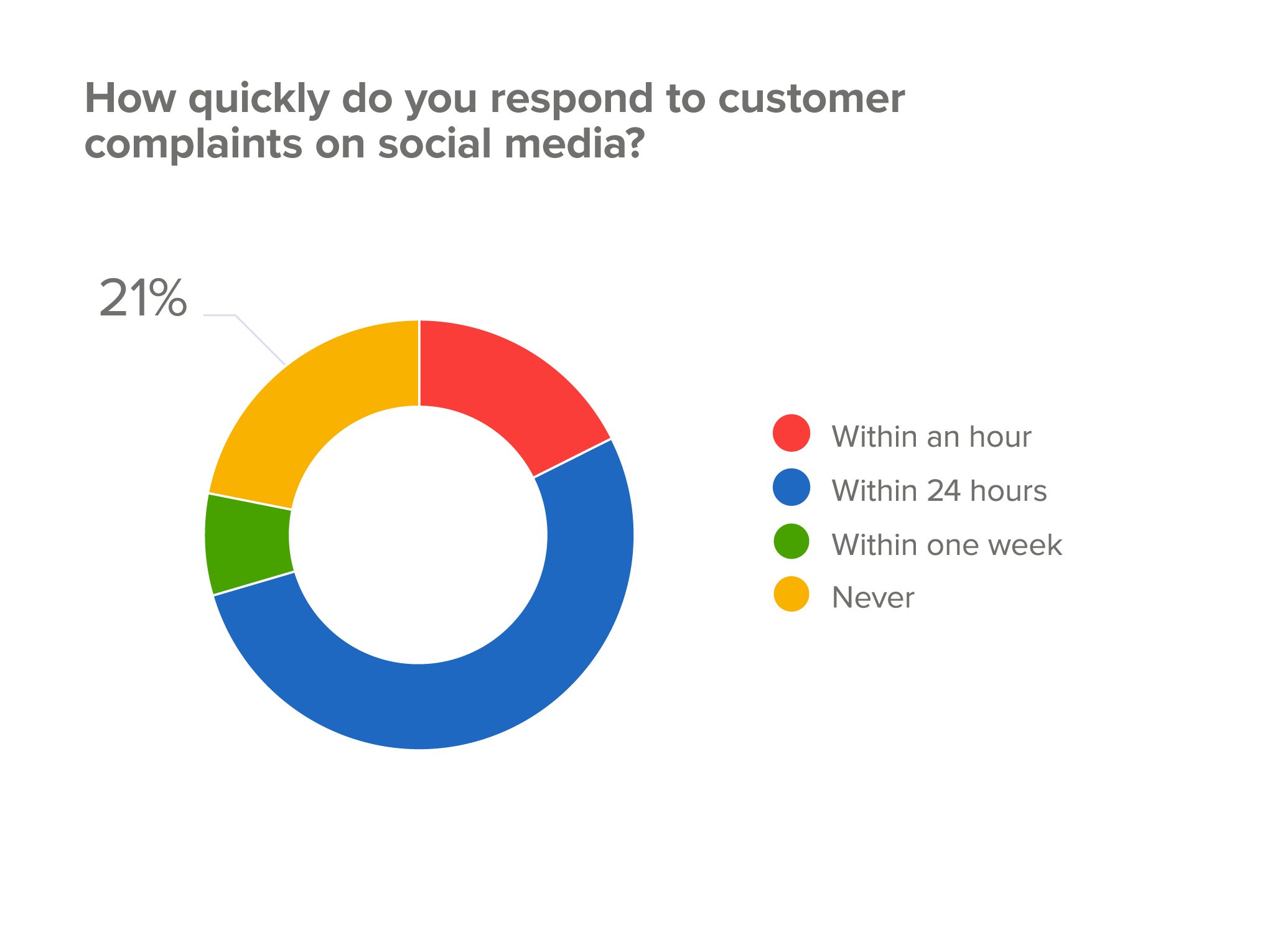Why You Need to Speed Up Your Social Media Response Time (and How)
This guide will explore the importance of swift social media response times and provide actionable strategies to improve your team's efficiency.

In today's fast-paced digital world, consumers expect brands to respond to their inquiries and concerns promptly. Slow response times can lead to customer dissatisfaction, damage your brand's reputation, and even drive customers away. This guide will explore the importance of swift social media response times and provide actionable strategies to improve your team's efficiency.
The Impact of Slow Response Times
- Lost Customers: Delayed responses can frustrate customers, leading them to seek solutions from competitors.
- Negative Word-of-Mouth: Dissatisfied customers may share their negative experiences with friends and family, harming your brand's reputation.
- Damaged Brand Trust: Slow response times can erode customer trust in your brand's ability to deliver quality products and services.
- Missed Opportunities: Delayed responses can prevent you from capitalizing on potential sales or customer loyalty opportunities.
Strategies to Improve Response TimesAssign Dedicated Social Media Teams:
- Create dedicated teams to monitor and respond to social media inquiries.
- Ensure team members have the necessary skills and knowledge.
- Provide clear guidelines and expectations for response times.
Utilize Social Media Management Tools:
- Employ tools to streamline social media management tasks.
- Use tools to track mentions, schedule posts, and analyze engagement.
- Consider tools with built-in response templates to speed up the process.
Establish Clear Response Time Goals:
- Set specific response time goals for different types of inquiries (e.g., customer complaints, product questions).
- Communicate these goals to your team and hold them accountable.
- Continuously monitor and adjust goals based on performance.
Train Your Team on Effective Communication:
- Provide training on active listening, empathy, and problem-solving.
- Teach your team how to communicate effectively and respectfully.
- Encourage team members to practice their communication skills.
Implement a Knowledge Base:
- Create a comprehensive knowledge base of frequently asked questions and their answers.
- Make the knowledge base easily accessible to your team.
- Regularly update the knowledge base to ensure accuracy and relevance.
Encourage a Culture of Customer Focus:
- Prioritize customer satisfaction throughout your organization.
- Foster a culture where employees feel empowered to help customers.
- Recognize and reward employees for excellent customer service.
Leverage Automation:
- Use automation tools to handle routine tasks, such as sending automated responses to common inquiries.
- Ensure that automated responses are personalized and helpful.
- Monitor automated responses closely to identify areas for improvement.
Monitor and Analyze Performance:
- Track response times and customer satisfaction metrics.
- Identify areas for improvement and take corrective action.
- Continuously refine your social media response strategy based on data.
Transactional Content Examples
Scenario 1: Customer Complaint
- Customer: "Received a defective product. Extremely disappointed with the quality."
- Brand Response (within 30 minutes): "We apologize for the inconvenience. Please provide your order number and a brief description of the issue. We'll send a replacement immediately."
Scenario 2: Product Inquiry
- Customer: "I'm interested in learning more about your new product line. What are the key features?"
- Brand Response (within 15 minutes): "Our new product line offers [features]. Would you like to schedule a demo to see it in action?"
Scenario 3: Positive Mention
- Customer: "Love your new product line! It's exceeded my expectations."
- Brand Response (within 5 minutes): "Thank you for your kind words! We're glad you're enjoying our products. Feel free to share your experience on social media using #[BrandHashtag]."
Final Thought
Improving your social media response times is essential for building customer satisfaction, loyalty, and brand reputation. By implementing the strategies outlined in this guide, you can create a more responsive and customer-centric social media presence. Remember, timely and effective communication is key to success in today's digital age.
FAQ:
Q: Why is it important to respond quickly to social media messages?
A: Quick responses demonstrate your brand's commitment to customer service, build trust, and prevent negative word-of-mouth. It also allows you to address issues promptly and capitalize on opportunities.
Q: What are some common reasons for slow response times?
A: Common reasons include understaffed social media teams, lack of proper tools, inefficient processes, and a lack of training for team members.
Q: How can I assign dedicated social media teams effectively?
A: Consider factors such as workload, expertise, and availability when assigning teams. Ensure they have the necessary tools and training to handle inquiries efficiently.
Q: What are some essential social media management tools?
A: Tools like Hootsuite, Sprout Social, and Buffer can help you track mentions, schedule posts, and manage multiple accounts.
Q: How can I create a knowledge base to improve response times?
A: A knowledge base can store frequently asked questions and their answers, allowing your team to provide quick and accurate responses.
Q: What training should my team receive for effective communication?
A: Train your team on active listening, empathy, and problem-solving. They should also be able to communicate clearly and respectfully.
Q: How can I measure the effectiveness of my social media response strategy?
A: Track metrics such as average response time, customer satisfaction ratings, and engagement rates. Analyze this data to identify areas for improvement.
Q: What should I do if I'm still struggling with slow response times?
A: Re-evaluate your strategy, consider additional resources, and seek expert advice. It may be necessary to make significant changes to improve your team's efficiency.
Get in Touch
Website – https://www.webinfomatrix.com
Mobile - +91 9212306116
WhatsApp – https://call.whatsapp.com/voice/9rqVJyqSNMhpdFkKPZGYKj
Skype – shalabh.mishra
Telegram – shalabhmishra
Email - info@webinfomatrix.com
What's Your Reaction?




















